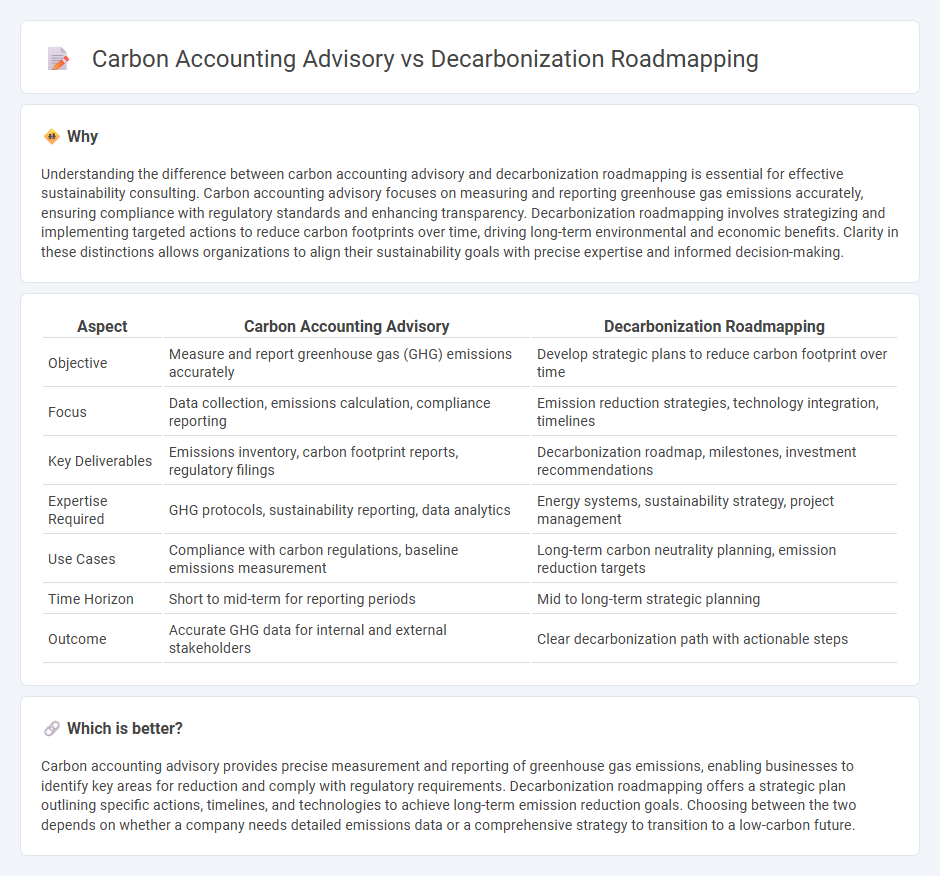
Carbon accounting advisory focuses on accurately measuring and reporting greenhouse gas emissions to ensure compliance with environmental regulations and sustainability goals. Decarbonization roadmapping involves creating strategic plans to reduce carbon footprints through targeted actions, technology adoption, and process improvements. Discover how these consulting services can help your organization achieve effective climate action and long-term sustainability.
Why it is important
Understanding the difference between carbon accounting advisory and decarbonization roadmapping is essential for effective sustainability consulting. Carbon accounting advisory focuses on measuring and reporting greenhouse gas emissions accurately, ensuring compliance with regulatory standards and enhancing transparency. Decarbonization roadmapping involves strategizing and implementing targeted actions to reduce carbon footprints over time, driving long-term environmental and economic benefits. Clarity in these distinctions allows organizations to align their sustainability goals with precise expertise and informed decision-making.
Comparison Table
| Aspect | Carbon Accounting Advisory | Decarbonization Roadmapping |
|---|---|---|
| Objective | Measure and report greenhouse gas (GHG) emissions accurately | Develop strategic plans to reduce carbon footprint over time |
| Focus | Data collection, emissions calculation, compliance reporting | Emission reduction strategies, technology integration, timelines |
| Key Deliverables | Emissions inventory, carbon footprint reports, regulatory filings | Decarbonization roadmap, milestones, investment recommendations |
| Expertise Required | GHG protocols, sustainability reporting, data analytics | Energy systems, sustainability strategy, project management |
| Use Cases | Compliance with carbon regulations, baseline emissions measurement | Long-term carbon neutrality planning, emission reduction targets |
| Time Horizon | Short to mid-term for reporting periods | Mid to long-term strategic planning |
| Outcome | Accurate GHG data for internal and external stakeholders | Clear decarbonization path with actionable steps |
Which is better?
Carbon accounting advisory provides precise measurement and reporting of greenhouse gas emissions, enabling businesses to identify key areas for reduction and comply with regulatory requirements. Decarbonization roadmapping offers a strategic plan outlining specific actions, timelines, and technologies to achieve long-term emission reduction goals. Choosing between the two depends on whether a company needs detailed emissions data or a comprehensive strategy to transition to a low-carbon future.
Connection
Carbon accounting advisory provides the foundational data analysis necessary to measure an organization's greenhouse gas emissions accurately. Decarbonization roadmapping uses this data to develop strategic, phased plans that prioritize emission reduction initiatives aligned with business goals. Together, they enable businesses to track progress, optimize resource allocation, and achieve sustainable carbon neutrality targets efficiently.
Key Terms
Emissions Baseline
Decarbonization roadmapping focuses on creating strategic plans to reduce greenhouse gas emissions over time, using the emissions baseline as a critical starting point to identify major sources and set reduction targets. Carbon accounting advisory provides accurate measurement, reporting, and verification of the emissions baseline, ensuring compliance with regulatory standards and enabling transparent tracking of progress. Explore our detailed services to understand how establishing a robust emissions baseline drives effective climate action initiatives.
Abatement Pathways
Decarbonization roadmapping involves creating strategic plans that outline abatement pathways to reduce greenhouse gas emissions systematically over time. Carbon accounting advisory focuses on measuring, reporting, and verifying emissions to establish baselines and track progress against these pathways effectively. Discover how integrating these approaches can optimize your organization's climate impact and sustainability goals.
Regulatory Compliance
Decarbonization roadmapping involves creating strategic plans that align long-term business goals with emission reduction targets, ensuring adherence to evolving regulatory frameworks such as the EU Emissions Trading System (ETS) and the U.S. Clean Air Act. Carbon accounting advisory focuses on measuring, verifying, and reporting greenhouse gas emissions accurately to comply with standards like the Greenhouse Gas Protocol and Science Based Targets initiative (SBTi), providing transparency and credibility in regulatory submissions. Explore detailed insights on how integrating both approaches enhances compliance and drives sustainable business transformation.
Source and External Links
Principles for developing sector decarbonisation roadmaps - Sector decarbonisation roadmaps are long-term strategic plans by policymakers to support the decarbonisation of key economic sectors and attract investment aligned with net zero goals.
Decarbonization Strategy & Roadmap | ENGIE Impact - A decarbonization roadmap is a holistic, customized action plan with clear milestones that integrates technology, financing, and organizational coordination to achieve an organization's decarbonization targets.
Creating a Decarbonization Roadmap for Success | Zeigo - A decarbonization roadmap outlines specific actions, milestones, and timelines to reduce carbon emissions through assessing current emissions, setting ambitious goals, identifying technologies, and implementing operational changes.
 dowidth.com
dowidth.com